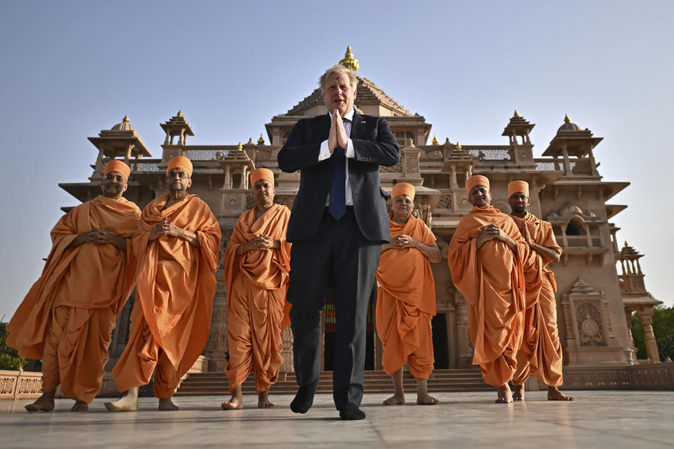New Delhi: Politics can be a farce and often distasteful, more so for detractors of Narendra Modi.
Every time headline hunters from the west travel to India, one particular section of Indian leaders, so-called liberals and intellectuals, get hyperactive. They start triggering debates on tolerance and human rights abuses, and the rights of minorities.
Boris Johnson was in India for a two-day visit. He spent in Gujarat for one day and spent time even visiting temples. India’s sickular brigade felt the pinch yet again. Nevertheless, in Delhi, Johnson sounded like a die-hard India admirer impressed by strong democratic traditions and sounded almost like a bosom friend of Prime Minister Narendra Modi.
Firstly, on India’s global positioning of equal distance in the Russia-Ukraine conflict, Johnson said: “I think you have to recognise that Indians have and actually PM Modi, in particular, have come out…very strong in their language about what happened in Bucha. And talking to PM Modi today, it’s clear that he has already intervened several times, and I am sure this is no secret from our Indian friends… he has intervened several times with Vladimir Putin to ask him… where he thinks this is going. And what India wants is peace and they want Russia out and I totally agree with that.”
“New Delhi has a historic relationship with Moscow which everyone understands and respects,” he added.
Again on the issue of human rights issues in India, the British PM was tongue-in-cheek: “How we deal with questions about human rights or democratic values, of course, we have these conversations, but the
advantage of our friendship is we can have them in a friendly and private way.”
In other words – he shows yet again faith in a ‘friend’ than the perception generally created in a section of the media and by Modi’s political detractors. Remember, a leader called Rahul Gandhi and his tweets. Lately, he got a deserving snub from Information and Broadcasting Minister Anurag Thakur, who said, “This is all you can expect from someone whose history is linked to corruption and riots. He [Rahul Gandhi] is doing no good to the country by sowing the seeds of hatred.”
Prime Minister Johnson also explained India’s strengths in its democratic and transparent Constitution.
“And I just want to say it is very important to realise that India has constitutional protections for communities, they are part of its Constitution,” the British PM echoed what Mr Modi and several BJP leaders try to emphasise from time to time.
“India is a very, very different country from autocracies around the world. It is a great, great democracy. It is a stunning, shining fact that 1.35 billion people who live under a democracy, and that’s something we should celebrate as it offers us an opportunity for closer cooperation and partnership,” said Johnson, leaving the liberal brigade red-faced.
Earlier, Johnson talked about India’s democracy and said, “India is one of the world’s oldest democratic countries and world’s largest democracy, sticking together and confronting our shared anxieties about autocracies around the world and we are acting together to make the world safer and more prosperous.”
In the past, the likes of Donald Trump and the US Secretary of State Antony Blinken have left India’s so-called sickular brigade frustrated and grieving.
In September 2019, US President Donald Trump said: “Like a father would bring it together. Maybe he [Modi] is the father of India. We will call him the father of India.” This was in Houston.
Trump, again in February 2020, during his visit to India, did not oblige the sickular class on the Hindu-Muslim clashes on the streets of the national capital Delhi.
Last July, Antony Blinken, Joe Biden’s right-hand man and US Secretary of State, said – “The most remarkable democratic election in the world, in many ways, is here in India…. Americans admire Indians’ commitment to rights, democracy and pluralism. Indian democracy is powered by its free-thinking citizens.”




















Comments